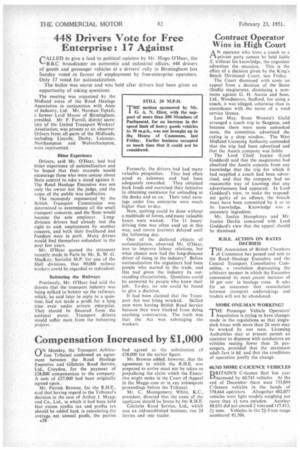448 Drivers Vote for Free Enterprise : 17 Against
Page 30

If you've noticed an error in this article please click here to report it so we can fix it.
rALLED to give a lead to political opinion by Mr. Hugo O'Hear, the B.B.0 broadcaster on economic and industrial affairs, 448 drivers of goods and passenger vehicles at a drivers' rally in Birmingham last
Sunday voted in favour of employment by free-enterprise operators. Only 17 voted for nationalization.
The ballot was secret and was held after drivers had been given an opportunity of asking questions.
The meeting was organized by the Midland areas of the Road Haulage Association in conjunction with Aims of Industry, Ltd. Mr. Norman Tiptaft, a former Lord Mayor of Birmingham, presided. Mr F. Farrell. district secretary of the United Transport Workers' Association, was present as an observer. Drivers from all parts of the Midlands, including Lincoln, Derby. Leicester, Northampton and Wolverhampton, were represented.
Bitter Experience Drivers, said Mr. O'Hear, had had bitter experience of nationalization and he hoped that their example would encourage those who were uneasy about State control to take a stand against it. The Road Haulage Executive was not only the owner but the judge, and the voice of the public was ineffective.
The monopoly represented by the British Transport Commission was determined to exterminate all the small transport concerns, and the State would become the sole employer. Longdistance drivers had already lost the right to seek employment by another concern, and both their livelihood and freedom were in peril. Many drivers would find themselves redundant in the next few years. Mr. O'Hear quoted the statement recently made in Paris by Mr. R. W. G. MacKay, Socialist M.P. for one of the Hull divisions, that 90,000 railway workers could be regarded as redundant.
Bolstering the Railways Previously, Mr. O'Hear had told the drivers that the transport industry was being milked to bolster up the railways, which, he said later in reply to a question, had not made .a profit for a long time even under private enterprise. They should be financed from the national purse. Transport drivers would suffer most from the bolstering process. Formerly, the drivers had had many valuable perquisites. They had often acted as salesmen and had been adequately rewarded. They 'obtained back loads and exercised their initiative in obtaining assistance for unloading at the docks and so on. Their total earnings under free enterprise were much higher than to-day.
Now, nothing could be done without a multitude of forms, and many valuable hours were wasted. The 11 hours' driving time was often used up in this way, and return journeys delayed until the following day.
One of the declared objects of nationalization, observed Mr. O'Hear, was to improve labour relations, but what chance now had the long-distance driver of rising in the industry? Before nationalization the organizers had been people who started in the trade, and this had given the industry its outstanding characteristic. Questions could be answered by people who knew their job. To-day, no one could be found to give a decision.
It had been claimed that the Transport Act was being wrecked. Skilled men were leaving British Road Service because they were blocked from doing anything constructive. The truth was that the Act was sabotaging the workers.




















































































